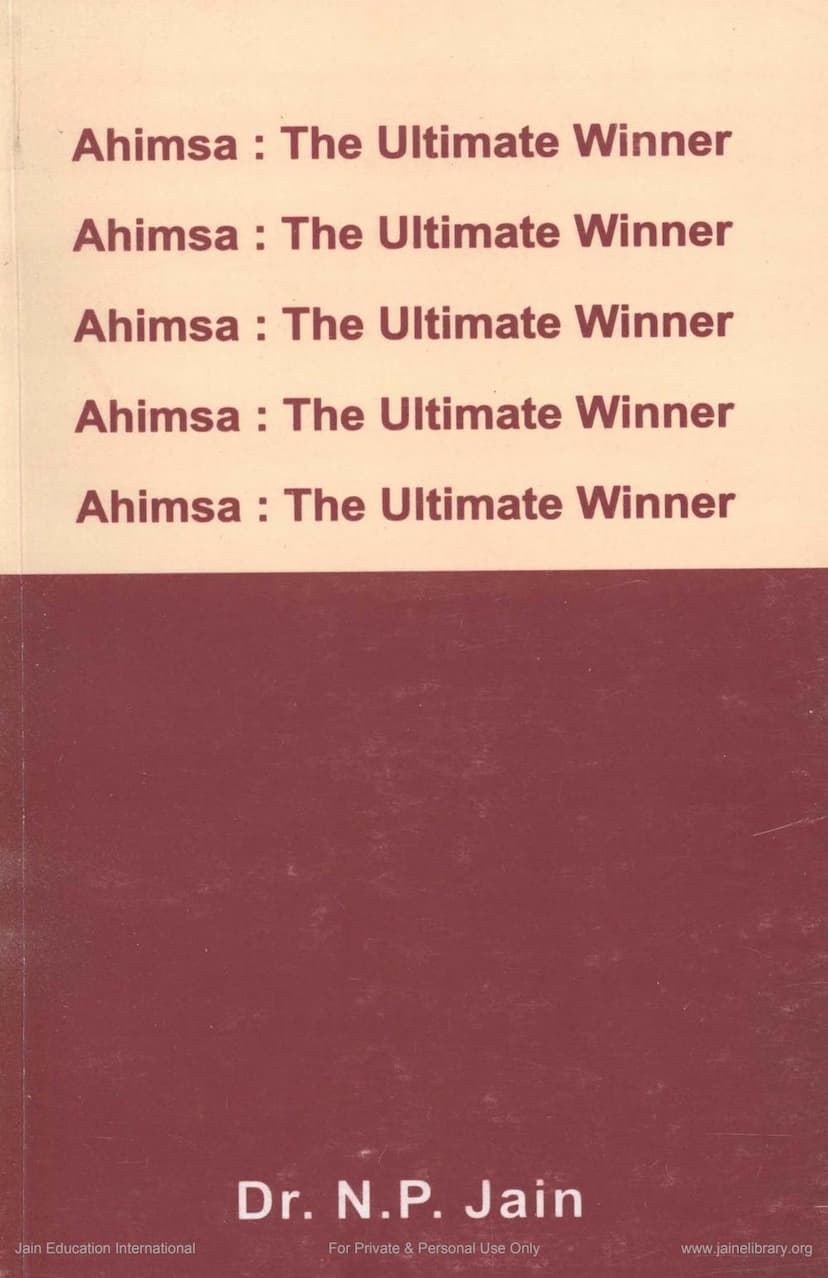Ahimsa The Ultimate Winner
Added to library: September 1, 2025

Summary
This comprehensive summary outlines the core themes and content of "Ahimsa: The Ultimate Winner" by Dr. N.P. Jain, as presented in the provided text.
Book Title: Ahimsa: The Ultimate Winner Author: Dr. N.P. Jain Publisher: Prakrit Bharti Academy
Overview:
"Ahimsa: The Ultimate Winner" compiles the major presentations and keynote speeches of Dr. N.P. Jain, a distinguished diplomat and renowned Jain scholar, on the theme of peace through non-violence. The book advocates for Ahimsa (non-violence) as the paramount principle for individual conduct, societal harmony, environmental preservation, and global peace, drawing heavily from Jain philosophy. It emphasizes the universal relevance of Jain teachings, particularly in the context of contemporary global challenges like violence, terrorism, and environmental degradation.
Key Themes and Content:
The book is structured into four parts, covering various facets of Ahimsa and Jainism's relevance to the modern world:
Part 1: Worldwide 2600th Birth Anniversary Celebrations of Tirthankar Mahavir (2001-2002 & 2003)
- Declaration on Ahimsa: A pledge adopted at Ahimsa Varsh celebrations, calling for a global commitment to non-violence and its inclusion in the UN Charter.
- Legacy of Mahavir: Explores the life and teachings of Lord Mahavir, highlighting his emphasis on equality, non-violence, environmental consciousness, and his role in shaping Jainism as an ethical way of life.
- Ahimsa and Ecology: Connects Jain principles to environmental protection, emphasizing the interdependence of all life and the need for reverence for nature.
- Practicing Jainism in the 21st Century: Discusses how Jain principles like Ahimsa, Anekant, and Aparigraha can guide modern life, focusing on the "Religion of Environment" and the "Religion of Non-Violence." It also touches upon the "Wave of Bliss" experienced by Westerners embracing Jainism.
- Life of Mahavir: A detailed account of Mahavir's spiritual journey, renunciation, enlightenment, and his teachings on compassion and non-violence.
- To Forgive is Divine: Explores the Jain concept of Kshama (forgiveness) as a crucial element of Ahimsa, emphasizing its role in personal and social harmony.
- Jainism - The Art of Living: Presents Jainism as a practical philosophy for living a balanced, ethical, and compassionate life, focusing on self-control, detachment, and interdependence.
Part 2: Parliament of World's Religions (Chicago 1993 & Cape Town 1999)
- Jain Religion - Universal Relevance in the Contemporary World: Argues for the timeless applicability of Jain principles like Ahimsa, Aparigraha, and Anekant in addressing global issues.
- Spiritual Resurgence - The Sheet Anchor for World Peace: Highlights the necessity of spiritual awakening to counter materialism and foster global peace.
- Global Commitment to the Culture of Non-Violence: Advocates for non-violence not just as a religious concept but as a universal ethical imperative, applicable in international relations, food consumption, and environmental practices. It emphasizes the "three Ns": Non-violence, Non-absolutism, and Non-possession.
- Vegetarianism – The Jain Experience: Delves into the spiritual, emotional, ethical, environmental, and nutritional rationale behind Jain vegetarianism, advocating for its wider adoption.
- Role of Jainism in Promoting Inter-faith Creative Engagement: Suggests how Jain principles of non-violence, tolerance, and mutual respect can foster inter-faith understanding and cooperation.
- Jainism and the Concept of Progress: Defines progress in Jainism as an integrated spiritual and ethical pursuit, distinct from unchecked materialism.
- Jainism and the Concept of Equality: Emphasizes Jainism's stance against discrimination based on gender, race, ethnicity, or class, highlighting the equality of all souls.
Part 3: Conferences of the United Nations
- Environment, Life Ethics and Jain Religion (UN Millennium Peace Summit): Reasserts Jainism's ecological relevance, emphasizing the interconnectedness of life and the need for a "Religion of Environment."
- Conflict Resolution Through Non-Violence in Action (UN Millennium Peace Summit): Outlines Jain methods for conflict resolution, emphasizing attitudinal transformation, education in non-violence, and inter-faith cooperation.
- Voice of Jainism, Jain View on Balance Between Nature and Humans, Towards a Global Saints' Brigade, Spiritual Perception - A New Beginning, Earth Ethics, Ecology and Economics (UN Earth Summit & Sacred Earth Gathering): These sections detail Jain contributions to global environmental discourse, advocating for a spiritual and ethical approach to nature conservation, the formation of a "Global Saints' Brigade," and the integration of economics with ecological principles.
Part 4: International Jain Conferences
- Spirit of Non-Violence for Posterity: Focuses on transmitting Jain heritage and the practice of Ahimsa to future generations.
- Promoting Non-Violence in Theory and Practice: Discusses the multi-faceted nature of Ahimsa and practical training methods for cultivating non-violent behavior.
- Jainism - A Way of Life: Highlights the historical depth and practical applicability of Jainism as a comprehensive philosophy for life.
- World View of Jainism: Explores Jain cosmology, the concept of souls (Jiva), the interdependence of life forms, and the scientific basis of Jain philosophy.
- Peace Through Non-Violence: Argues that true peace can only be achieved through a global culture of non-violence, addressing issues from resource abuse to human-on-human violence.
- Training for Non-Violence: Outlines a comprehensive approach to training individuals and societies in non-violent principles and practices, starting from the individual.
- Ahimsa Yatra: Discusses the significance of Acharya Mahapragyaji's walking pilgrimage across India, promoting non-violence, ethical values, and spiritual rejuvenation.
Overall Message:
Dr. N.P. Jain's "Ahimsa: The Ultimate Winner" is a powerful articulation of Jain philosophy's enduring relevance in addressing the multifaceted crises facing humanity. It champions Ahimsa not merely as a religious tenet but as a universal ethical framework for individual transformation, societal progress, environmental stewardship, and sustainable global peace. The book underscores the need for a spiritual and moral resurgence, integrated with scientific advancement, to create a more compassionate, just, and harmonious world.